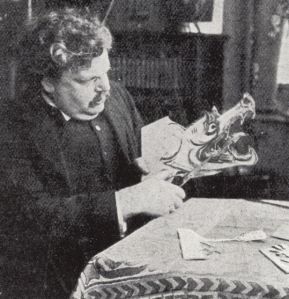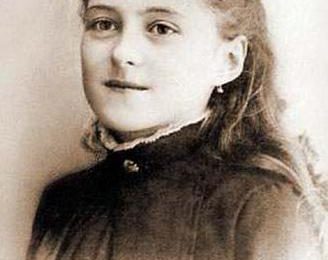“If a thing is worth doing, it is worth doing badly.” G.K. Chesterton
I remember as a child combing through the dried pages of my great-uncle’s stamp collection. There were stamps from all over the world which he had painstakingly glued into the parchment-like scrap book, and though he was deceased by the time the beloved collection had reached my hands, it seemed alive, alive with him. The collection reflected something about him: it showed his interest in the world, his love of beauty, love of order, and his love of art. A friend of mine said that her grandfather, too, had created a beautiful stamp collection which she, too, enjoyed as a child. The great English writer, G.K. Chesterton (b. 1874- d. 1936), when he was not writing the hundred plus books, poems, and essays that flowed from his (holy!) pen; or was not traveling, going to church, giving speeches, or debating his rivals; enjoyed making puppet theaters. His father counted this as one of his hobbies, as well. In his autobiography, Chesterton said of his father, who was a real estate agent by profession:
“To us (children) he appeared to be indeed The Man with the Golden Key, the magician opening the gates of goblin castles . . . but all this time he was known to the world, and even to the next door neighbours, as a very reliable and capable, though rather unambitious businessman. It was a very good lesson in what is also the last lesson in life: that in everything that matters, the inside is much larger than the outside. On the whole, I am glad that he was never a professional artist. It might have stood in his way of becoming an amateur. It might have spoilt his career — his private career.”
“On the whole, I am glad that he was never a professional artist. It might have stood in his way of becoming an amateur. It might have spoilt his career — his private career.”
I love that!
Today, people would ridicule the hobby of puppet theater creating; yet, it, and other such amateur hobbies, and creative endeavors, used to afford men a small reprieve from the demands of life, and gave amusement to family and friends.
Often, today, when we are not working, we are checking work by scanning our emails on our phones and/or computers; worse, we might check the news on the same devices, and end up bombarded by the most salacious stories that society offers, as that is the nature of news; they cannot report the millions of good stories that are going on at every minute, as that would take up too much time, so they hone in on the most atrocious stories; that’s simply the way the news world works. And, if we are exposed to such news on a near constant basis, our hearts can grow weary, and depressed. Breaking away from the never ending onslaught of bad news, and work, is healthy.
Developing a hobby is a good way to break away from such things: turning off all technology, and focusing for an hour, or two, on a little project that uses the mind, and the hands. It might be rock collecting. This takes time and thought: rocks can be gathered, labelled, and cataloged; Or a person might take up birding: one might start a journal on the birds sighted on a given day, at a given location. There are even birding clubs to join. My father has enjoyed the hobby of wood carving, and has created beautiful wooden pieces of art for every member of his family. They are beautiful items which, like my uncle’s stamp collection, possess something of him, as any created work does, and they are treasured. And, just because the pieces were made by what the snobbish might label an “amateur,” they, nonetheless, have something that the professional artist does not necessarily possess which is passion (GKC, quote below). The amateur works out of love; hence, there is something of a passion about the work, about the hobby. Chesterton summed it up this way:
“The word amateur has come by the thousand oddities of language to convey an idea of tepidity; whereas the word itself has the meaning of passion. Nor is this peculiarity confined to the mere form of the word; the actual characteristic of these nameless dilettanti is a genuine fire and reality. A man must love a thing very much if he not only practises it without any hope of fame or money, but even practises it without any hope of doing it well. Such a man must love the toils of the work more than any other man can love the rewards of it.”
It reminds me of the life of children. They engage in innumerable hobbies, collecting all sorts of knickknacks, cutting out pictures from coloring books, and pasting them onto plain white paper; forming figures out of string; and of course, creating with socks, and all sorts of crafting materials, a functioning puppet theater.
Children love creating. They are passionate about it, and they receive no monetary compensation for their work; hence they are amateurs. It is not until their creative work begins to be criticized by the professional art teacher (!), that the love of creating is typically ripped out of their lives. Yet, just a couple of generations ago, men of all ages continued to create via hobbies, and it was not until death did they depart from these little loves, and interests.
So what can be done?
I think we need to restore the love of hobbies by living, once again, as children do. Chesterton noted in his book about the British writer, Robert Louis Stevenson, that:
Familiarity had dulled the divine paradox that we should learn morality from little children. He (Stevenson, added by SF) advanced the more disturbing paradox that we should learn morality from little boys. The young child who should lead us was the common (or garden) little boy: the boy of the catapult and the toy pistol–and the toy theatre. Stevenson seemed to say to the semi-suicides drooping round him at the café tables; drinking absinthe and discussing atheism: “Hang it all, the hero of a penny-dreadful play was a better man than you are!”-Chesterton speaking on Robert L. Stevenson
Yes, in our jaded, grown-up age, where the love of little things has been lost, i.e. the love of husband and wife, the love of children, the love of babies, the love of God (!); we see the dying breaths of the young-old people, and the dying breaths of cynics, and naysayers, who mock the simple, and innocent, joys of living which once marked the life of the Christian man.
So, look at the picture of one Gilbert K. Chesterton at the head of this post: he was young enough to build a puppet theater at the age, I am guessing, perhaps, his mid-fifties, becoming as it were, the hero of a penny-dreadful play, and a better man than all of the cynics of our modern age.
Today, I hail amateurs who know that, “If a thing is worth doing, it is worth doing badly!” (GKC)
Have a good day, and a good weekend!
•SCF






